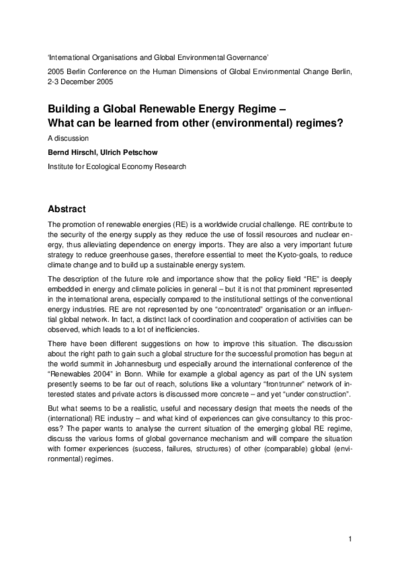Building a Global Renewable Energy Regime What can be learned from other (environmental) regimes
The promotion of renewable energies (RE) is a worldwide crucial challenge. RE contribute to the security of the energy supply as they reduce the use of fossil resources and nuclear energy, thus alleviating dependence on energy imports. They are also a very important future strategy to reduce greenhouse gases, therefore essential to meet the Kyoto-goals, to reduce climate change and to build up a sustainable energy system.
The description of the future role and importance show that the policy field “RE” is deeply embedded in energy and climate policies in general – but it is not that prominent represented in the international arena, especially compared to the institutional settings of the conventional energy industries. RE are not represented by one “concentrated” organisation or an influential global network. In fact, a distinct lack of coordination and cooperation of activities can be observed, which leads to a lot of inefficiencies.
There have been different suggestions on how to improve this situation. The discussion about the right path to gain such a global structure for the successful promotion has begun at the world summit in Johannesburg und especially around the international conference of the “Renewables 2004” in Bonn. While for example a global agency as part of the UN system presently seems to be far out of reach, solutions like a voluntary “frontrunner” network of interested
states and private actors is discussed more concrete – and yet “under construction”.
But what seems to be a realistic, useful and necessary design that meets the needs of the (international) RE industry – and what kind of experiences can give consultancy to this process? The paper wants to analyse the current situation of the emerging global RE regime, discuss the various forms of global governance mechanism and will compare the situation with former experiences (success, failures, structures) of other (comparable) global (environmental) regimes.



